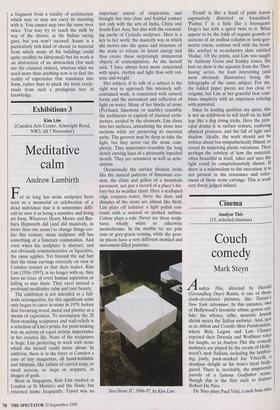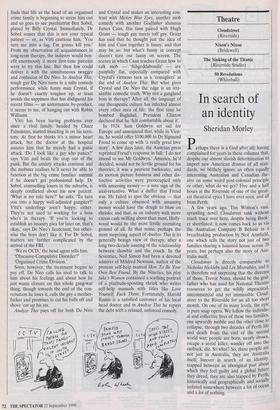Cinema
Analyze This
(15, selected cinemas)
Couch comedy
Mark Stcyn
Analyze This, directed by Harold (Groundhog Days) Ramis, is one of those clash-of-cultures pictures, like Tarzan's New York Adventure. In this instance, two of Hollywood's favourite ethnic genres col- lide: the whiney, talky, neurotic Jewish shrink meets the Italian mobster. And, just as in Abbott and Costello Meet Frankenstein, where Bela Lugosi and Lon Chaney reprised their Dracula and Wolfman roles for laughs, so in Analyze This the comedy mobsters are played by the cream of Holly- wood's mob Italians, including the lumber- ing, jowly, pock-marked Joe Viterelli, a deadpan delight as his boss's loyal body- guard. There is, inevitably, the umpteenth parody of a famous Godfather scene, though this is the first such to feature Robert De Niro. De Niro plays Paul Vitti, a mob boss who finds that life as the head of an organised crime family is beginning to stress him out and so goes to see psychiatrist Ben Sobol, played by Billy Crystal. Immediately, Dr Sobol senses that this is not your typical patient — or, as Vitti cautions him, 'You turn me into a fag, I'm gonna kill you.' From my observation of acquaintances in long-term therapy, the industry would ben- efit enormously if more first-time patients were to try this line. But then few could deliver it with the simultaneous swagger and confusion of De Niro. In Analyze This, tough guy De Niro turns in a nifty comedy performance, while funny man Crystal, if he doesn't exactly toughen up, at least avoids the sappiness that has disfigured his recent films — an unfortunate by-product, it seems to me, of hanging out with Robin Williams.
Vitti has been having problems ever since a rival family, headed by Chazz Palminteri, started muscling in on his terri- tory. At first he thinks it's a minor heart attack, but the doctor at the hospital assures him that he merely had a panic attack. 'Do I look like a guy who panics?' says Vitti and beats the crap out of the punk. But the anxiety attacks continue and the mobster realises he'll never be able to function at the big crime families' summit if he doesn't get professional help. Dr Sobol, counselling losers in the suburbs, is deeply conflicted about his new patient. `What is my role here?' he asks. 'To turn you into a happy well-adjusted gangster?' Vitti's underlings aren't happy, either. They're not used to working for a boss who's in therapy. 'If you're looking to establish an insanity plea for later on, that's okay,' says De Niro's lieutenant, but other- wise the boys don't like it. For Dr Sobol, matters are further complicated by the arrival of the FBI.
`We're OCD,' the head agent tells him. `Obsessive-Compulsive Disorder?'
`Organised Crime Division.'
Soon, however, the treatment begins to pay off. De Niro calls his rival to talk to him about his feelings and about how he just wants closure on this whole gang-war thing, though towards the end of the con- versation he loses it, calls the guy a mother- fucker and promises to cut his balls off and shove 'em up his ass.
Analyze This pays off for both De Niro and Crystal and makes an interesting con- trast with Mickey Blue Eyes, another mob comedy with another Godfather alumnus James Caan, this time paired with Hugh Grant — tough guy meets toff guy. Grant has said that he thought just the idea of him and Caan together is funny, and that may be so: but what's funny in concept doesn't turn out funny on screen. The scenes in which Caan teaches Grant how to talk mob — luhgeddaboudif — are painfully flat, especially compared with Crystal's virtuoso turn as a `consiglieri' at the end of Analyze This. But what gives Crystal and De Niro the edge is an irre- sistible comedic truth. Why not a gangland boss in therapy? After all, the language of our therapeutic culture has infected almost every other area of life: the first time he bombed Baghdad, President Clinton declared that he 'felt comfortable about it'.
In 1924, Sam Goldwyn set sail for Europe and announced that, while in Vien- na, he would offer $100,000 to Dr Sigmund Freud to come up with 'a really great love story'. A few days later, the Austrian press reprinted Freud's response in full: 'I do not intend to see Mr Goldwyn.' America, he'd decided, would not be fertile ground for his theories; it was a prurient backwater, and its motion picture business and other dis- tinctive activities were preoccupied only with amassing money — a sure sign of the anal-retentive. What a duffer that Freud was. He failed to spot the obvious — that only a culture obsessed with amassing money would have the dough to blow on shrinks; and that, as an industry with more excess cash swilling about than most, Holly- wood would be the most fertile recruiting ground of all. In that sense, perhaps the most surprising aspect of Analyze This is its generally benign view of therapy, after a long two-decade souring of the relationship between showbiz and the couch. In the Seventies, Neil Simon had been a devoted admirer of Mildred Newman, author of the protean self-help manual How To Be Your Own Best Friend. By the Nineties, his play fake's Women contained a scathing portrait of a platitude-spouting shrink who writes self-help manuals with titles like Love Yourself Fuck Them. Fortunately, Harold Ramis is a satisfied customer of his local head doctor and in Analyze This he repays the debt with a relaxed, unforced comedy.



























































































 Previous page
Previous page